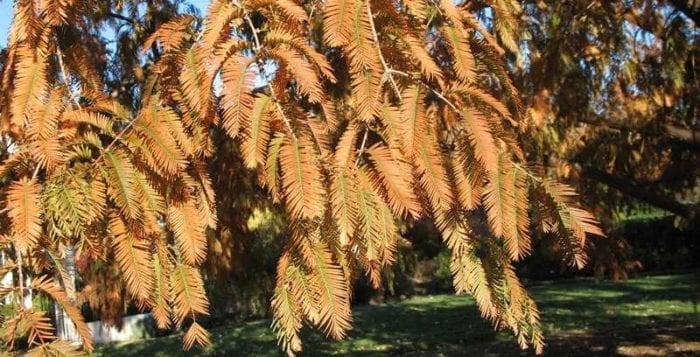By Ellen Barcel
Heritage Park in Mount Sinai has many unique plantings. One really interesting section is the walkway lined with trees representing each of the 50 states. New York’s state tree, along with Vermont, West Virginia and Wisconsin, is the sugar maple (Acer saccharum). A tree native to Long Island, the flowering dogwood (Cornus florida) is the state tree of Missouri and Virginia. Both maple and dogwood do well here. Oak, which also grows well on Long Island in one variety or another, is the state tree of Connecticut, Georgia, Illinois, Maryland and Washington, D.C.
But, in planning this interesting homage to the 50 states, it became clear that not every tree that represents each state would be able to grow in Long Island’s climate or was suitable for the walkway. Hawaii’s state tree, the candlenut, (Aleurites moluccanus, also known as kukui), wouldn’t survive in Long Island’s cold climate, for example. So, Fred Drewes, who planned out the walkway, needed to make substitutions. One was the tree for California.
The dawn redwood has been planted at Heritage Park to represent the state of California. It was chosen since the giant redwood, California’s state tree, is not an ideal tree for the walkway. The giant redwood becomes an enormous tree, overwhelming the surrounding area with an extensive root system. It produces a tremendous amount of shade so very little will grow under it. Its shallow roots mean that the tree can be easily damaged by wind. Hence the decision to plant the related tree.
The dawn redwood (Metasequoisa glyptostroboides) is sometimes called a living fossil. Scientists believed that the tree had gone extinct until it was “rediscovered” in 1941 in China. The fossils of the tree have been found in many parts of the Northern Hemisphere as well going back to the Mesozoic Era. The Mesozoic Era (the time of the dinosaurs) ended approximately 66 million years ago. Since its rediscovery, the tree has become a popular ornamental due to its attractive pyramidal shape and rapid growth.
A conifer, it has another distinction — it’s deciduous. Usually we expect conifers (cone-bearing plants) to be evergreens, keeping their needles through the winter. Dawn redwood, the smallest of the redwoods is still potentially a large tree. According to the Arbor Day Foundation, it is fast growing and can easily reach 100 feet or more. It does well in zones 5 to 8 with Long Island being zone 7. It prefers full sun and moist, well-drained soil but even tolerates clay soil. While it is widely adaptable, it does best in a soil pH of 4.5 (that’s very acidic), great for Long Island’s soil. It’s pretty much maintenance and disease free.
One of the advantages of a deciduous tree is that with the leaves (or needles in this case) gone in winter, the sun can warm a nearby house. But come the heat of summer, the tree provides shade to cool the area. Needles appear in the spring as light green, darken over the summer and turn reddish-brown in fall. Since it’s fast growing, it can provide privacy fairly quickly. It is somewhat deer resistant (we know that no plant is completely deer proof if the deer are hungry enough) and tolerates pollution; so it can be planted near roadways or in cities. Its deeply grooved bark and branches give the tree winter interest.
The small female cones are uniquely shaped and are on the same tree as the male ones. If you’re really interested in growing one or more dawn redwood, the website www.dawnredwood.org will provide more detailed information.
Take a walk around Heritage Park and look at the various trees planted there. This will give you a good idea of what trees you may want to plant in your own garden. If you decide to plant a dawn redwood, remember that this is a big tree. Give it plenty of room and don’t make the mistake of planting it too close to your house.
Ellen Barcel is a freelance writer and master gardener. To reach Cornell Cooperative Extension of Suffolk County and its Master Gardener program, call 631-727-7850.





